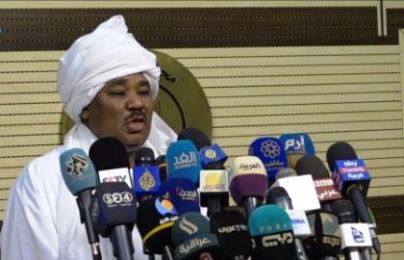Government announces first post-Bashir budget to repair Sudan’s finances
December 27, 2019 (KHARTOUM) – The Sudanese Council of Ministers on Friday approved the 2020 budget, which includes a progressive liberalization of fuel prices but continues to subsidize wheat and cooking gas, as part of its drive to repair public finances.

He further added that following the discussions with the FFC, the joint meeting of the cabinet and the Sovereign Council will deliberate on it as the parliament before to be voted endorsed as a law.
In his press conference, the minister did not reveal the total figures of the budget, saying that they are preliminary and subject to modifications.
He said that the first budget under the post-al-Bashir area includes positive changes, citing doubling spending on health and education, preventing the imposition of any school fees, providing a free school meal for pupils in the country. Also, the budget guarantees free hospital treatment and increases salaries by 100%.
On for the fuel prices, al-Badawi said that the cabinet authorized the lifting of subsidies in principle without elaborating.
“A programme has been included that to continue to subsidise wheat and cooking gas subsidies, while fuel subsidies will be gradually lifted,” he further said.
The cash-strapped East African country is under pressure from the International Monetary Fund (IMF) and the World Bank to cut spending and reform subsidies.
On 23 December, the IMF released a statement called on the Sudanese government to implement critical reforms to address major macro imbalances and create the conditions for sustained inclusive growth.
“However, the challenges facing the new government are daunting. The economy is shrinking, fiscal and external imbalances are large, inflation is high, the currency is overvalued, and competitiveness is weak,” said the IMF.
The IMF stressed that these bold and comprehensive reforms are needed to stabilize the economy and strengthen growth.
Further, to counter the negative impact on the poor Sudanese who represent 65% of the population the international financial organisation propose to expand a social safety net.
The minister revealed the implementation of a pilot programme for direct cash transfer of 1,500 pounds per family every month. During the first phase, about four million persons(900,000 families) form the whole country will benefit from this programme, “according to available resources”
He said that the experimental programme of cash transfer will be developed into a programme for basic income under the supervision of a national commission to cover between 60% to 80% of the population during the transitional period.
The government will also increase the umbrella of the direct cash guarantee program for the university student by and the total number of those benefiting from this programme will be at 300,000 students.
He said that the experimental programme of cash transfer will be developed into a programme for basic income under the supervision of a national commission to cover between 60% to 80% of the population during the transitional period.
The government will also increase the umbrella of the direct cash guarantee program for the university student by and the total number of those benefiting from this programme will be at 300,000 students.
In the same vein, the government will expand the umbrella of health insurance for poor families estimated at 4 million and 900 thousand families.
Al-Badawi disclosed that 7% of the 2020 budget will be allocated to the war-affected regions for development programs.
The information minister and government spokesman Faisal Mohamed Saleh said that the budget was the first in the history of Sudan to be prepared and discussed in total transparency.
He was referring to the different debates and criticisms directed against the approach chosen by al-Badawi which is in line with the receipts designed by the international financial institutions.
The Forces for Freedom and Change on Wednesday rejected the draft budget.
The leader of the Sudanese Congress Party Omer al-Digair on Friday said that the IMF receipt – based on the lifting of subsidies and liberalizing the exchange rate – had been already tried elsewhere and failed.
Sudanese government bets on the country’s delisting from the state sponsors of terrorism list which blocks the foreign debt relief and the clearance of debt arrears.
‘”The large external debt and arrears hinder access to external financing and weigh heavily on development,” said the IMF on 23 December.
(ST)
